Design Options for Concrete Driveways: Choosing the Right Style for Your Home
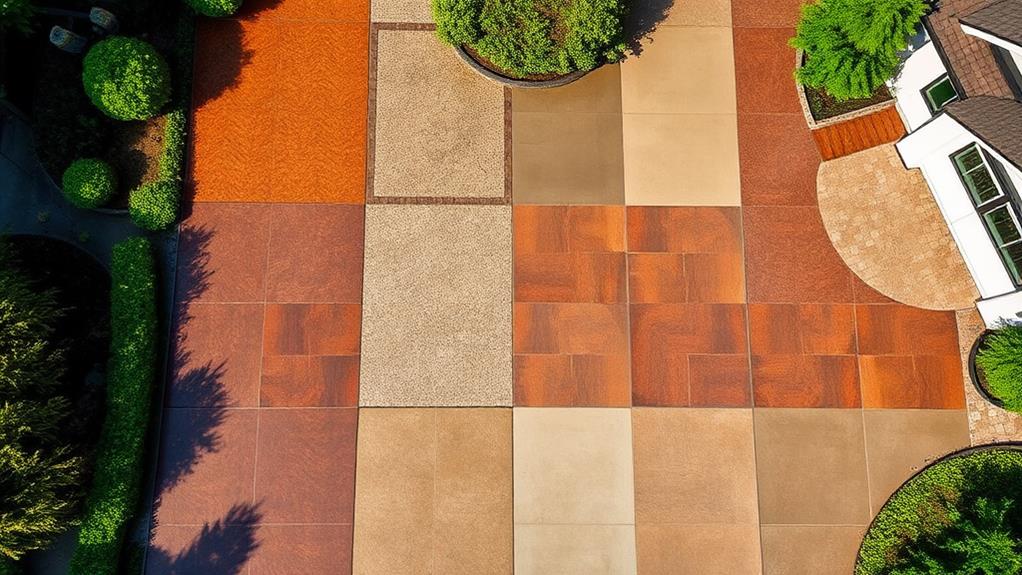
When you're considering a new driveway, concrete offers an array of design possibilities that can elevate your home's curb appeal. You'll find that concrete isn't just about plain gray slabs anymore. From stamped patterns that mimic expensive materials to colorful finishes that complement your home's exterior, the options are vast and varied. But with so many choices available, how do you decide which style is right for your property? The key lies in understanding the different techniques, considering your home's architecture, and balancing aesthetics with practicality. Let's explore the exciting world of concrete driveway designs and how they can transform your home's entrance.
Concrete Contractor Highlights
- Stamped concrete offers versatile design options mimicking brick, stone, or tile for a customized look.
- Color choices range from warm, earthy tones to bold hues, complementing your home's architecture.
- Exposed aggregate finishes provide texture and slip-resistance for enhanced safety and visual appeal.
- Incorporation of borders, medallions, or custom logos adds unique touches to your driveway design.
- Polished concrete surfaces with decorative saw cuts or inlaid designs create a sleek, modern aesthetic.
Concrete Contractor Services Residential And Commercial
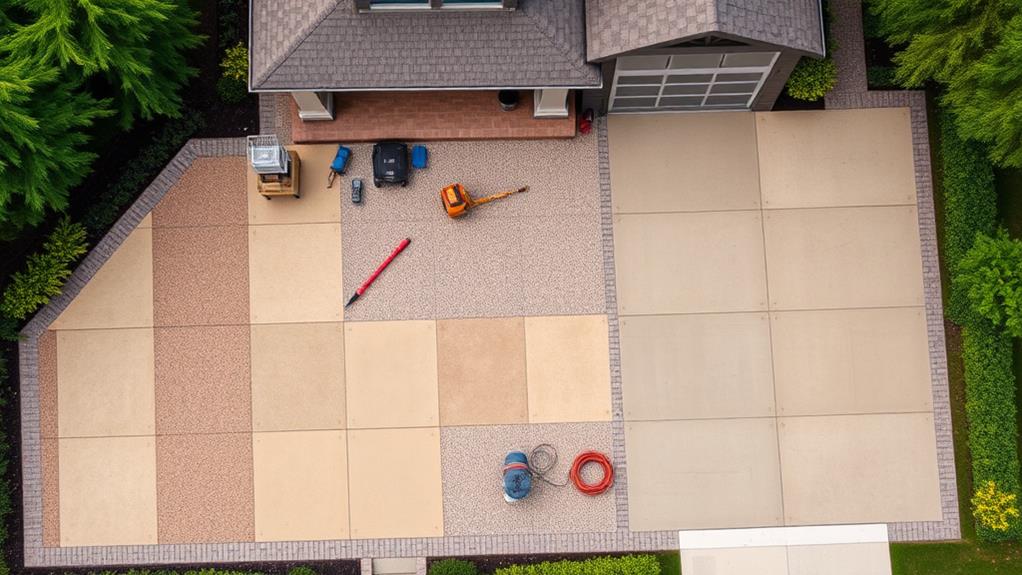
Our experienced concrete contractors offer thorough services for both residential and commercial properties, specializing in designing and installing high-quality concrete driveways. We work closely with homeowners and business owners to select the perfect style, texture, and color options. Our driveways seamlessly integrate with landscaping to complement their property's aesthetics and meet functional needs.
Our team utilizes advanced techniques and premium materials to safeguard durable, long-lasting results that withstand heavy traffic and harsh weather conditions. From stamped concrete patterns to decorative finishes, we provide a wide range of customization options to create unique and attractive driveways. With our expertise in proper site preparation, reinforcement, and curing processes, we guarantee a professional installation that enhances curb appeal and adds value to your property.
Composition of Concrete Mixtures
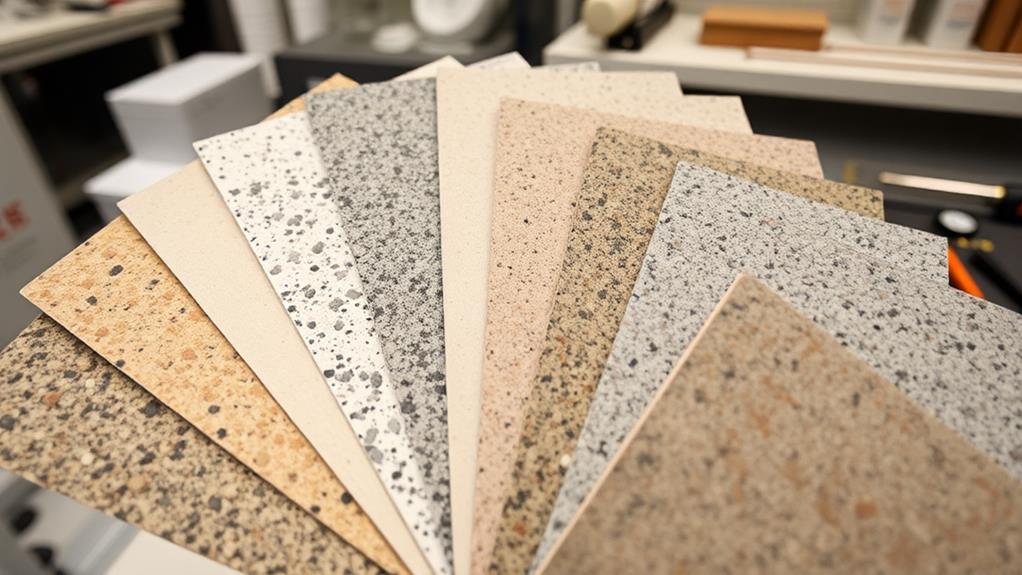
When considering concrete for your driveway, you'll need to understand the various mixtures available to achieve your desired results. Concrete driveways come in a range of finishes from functional to decorative, which allows for both durability and an enhanced curb appeal.
Standard concrete mix forms the foundation for most projects, while decorative additives can enhance the visual appeal and texture of your driveway. For those seeking superior durability and performance, high-performance concrete formulations offer advanced properties tailored to specific environmental conditions and usage requirements.
Standard Concrete Mix
The four main ingredients in a standard concrete mix are cement, water, sand, and gravel. These components work together to create a durable and versatile material for your driveway. The cement acts as a binder, reacting with water to form a paste that coats the sand and gravel particles.
As the mixture cures, it hardens into a solid, stone-like substance that can withstand heavy loads and environmental stresses.
You'll find that the proportions of these ingredients are carefully balanced to achieve the desired strength and workability. Typically, a standard mix consists of 10-15% cement, 15-20% water, 25-30% sand, and 40-50% gravel. However, these ratios may be adjusted based on specific project requirements or local conditions.
It's essential to maintain the proper water-to-cement ratio, as too much water can weaken the concrete, while too little can make it difficult to work with. Professional contractors use specialized equipment to measure and mix these ingredients precisely, ensuring consistency and quality in your driveway's foundation.
Decorative Concrete Additives
While standard concrete provides a durable foundation for your driveway, decorative additives can transform it into a stunning visual element of your home's exterior. These additives come in various forms, including pigments, aggregates, and fiber reinforcements, each offering unique aesthetic and functional benefits. By incorporating colored pigments into the concrete mix, you can achieve a wide spectrum of hues that complement your home's architecture and landscaping. Aggregates, such as exposed river rocks or crushed glass, can be added to create textured surfaces with enhanced visual interest and improved traction.
For those seeking to elevate their driveway's appearance further, fiber reinforcements offer both structural integrity and decorative potential. These fibers, typically made from polypropylene or nylon, can be mixed into the concrete to reduce cracking and increase durability. Additionally, they can be used to create intricate patterns or textures when the concrete is stamped or etched. By carefully selecting and combining these decorative additives, you'll be able to create a driveway that not only serves its practical purpose but also enhances your home's curb appeal and reflects your personal style.
High-Performance Concrete Formulations
High-performance concrete formulations elevate your driveway beyond standard mixes, offering superior strength, durability, and longevity. These advanced mixtures incorporate carefully selected materials and precise proportions to enhance the concrete's performance in various environmental conditions.
You'll find that high-performance concrete typically includes supplementary cementitious materials like silica fume, fly ash, or ground granulated blast furnace slag, which improve the mixture's density and reduce permeability.
When selecting a high-performance formulation for your driveway, consider factors such as compressive strength, flexural strength, and resistance to freeze-thaw cycles. These formulations often feature lower water-to-cement ratios, which contribute to increased durability and reduced shrinkage.
Additionally, high-performance concrete may incorporate specialized admixtures that enhance workability, control setting time, or improve resistance to chemical attack. By choosing a high-performance concrete formulation, you're investing in a driveway that will maintain its structural integrity and aesthetic appeal for years to come, potentially reducing long-term maintenance costs and increasing your property's value.
Consult with a concrete specialist to determine the most suitable high-performance mixture for your specific climate and usage requirements.
Benefits
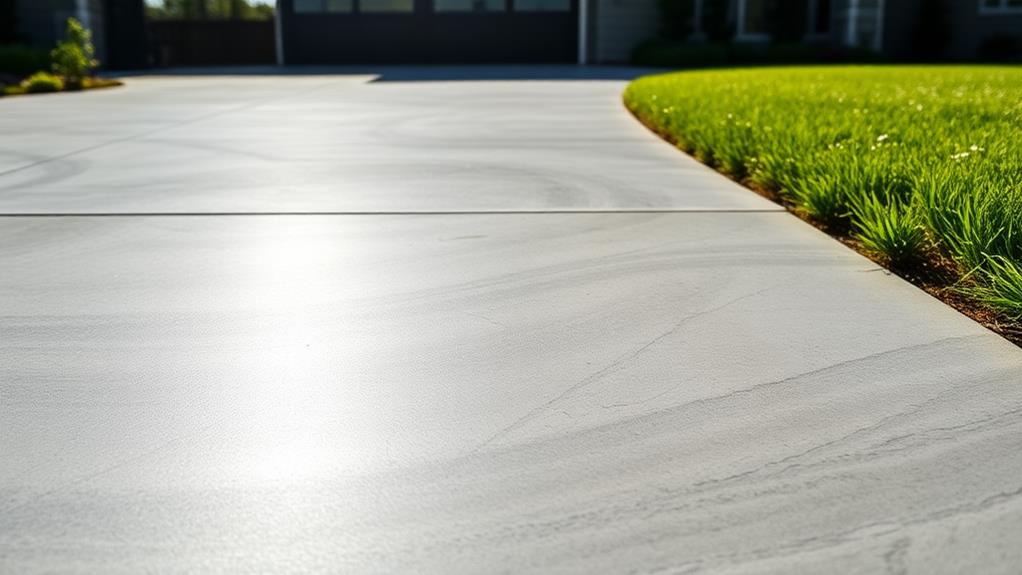
When considering a concrete driveway for your home, you'll find numerous benefits that make it an appealing option. Concrete's durability and longevity stand out, offering a surface that can withstand heavy loads and harsh weather conditions for decades.
Another advantage is its low maintenance, as concrete can be easily cleaned with soap and water, saving you time and money on upkeep over the years. Additionally, concrete driveways are cost-effective compared to other paving materials like asphalt, providing a high return on investment.
Moreover, concrete's versatility in design allows for customization through various textures, colors, and patterns, which can drastically enhance your property's curb appeal and potentially increase its overall value.
Durability and Longevity
Concrete driveways stand out from the crowd due to their impressive durability and longevity. When you choose a concrete driveway, you're investing in a surface that can withstand decades of use, harsh weather conditions, and heavy vehicle traffic. Unlike asphalt or gravel alternatives, concrete doesn't require frequent resurfacing or replacement, saving you time and money in the long run.
The robust nature of concrete means it's resistant to cracking, chipping, and deterioration caused by freeze-thaw cycles. With proper installation and maintenance, your concrete driveway can easily last 30 years or more. This longevity is particularly appealing if you're planning to stay in your home for an extended period or looking to increase your property's value.
Additionally, concrete's durability extends to its ability to support heavy loads without sinking or developing ruts. This makes it an ideal choice for homes with multiple vehicles or those who frequently host guests. The material's resistance to oil and other automotive fluids also contributes to its long-lasting appeal, as it's less likely to stain or degrade over time compared to other driveway materials.
Low Maintenance Requirements
When you choose a concrete driveway, you're opting for a surface that's not only durable but also incredibly low-maintenance. Unlike other materials that require frequent upkeep, concrete allows you to spend less time on chores and more time enjoying your home's exterior.
Your concrete driveway will resist stains, withstand harsh weather conditions, and maintain its appearance with minimal effort on your part. You'll find that regular sweeping and occasional washing with a garden hose are often sufficient to keep your driveway looking pristine. For tougher stains, a mixture of warm water and mild detergent can usually do the trick, eliminating the need for harsh chemicals or specialized cleaning products.
Moreover, concrete's smooth surface makes snow removal a breeze during winter months, reducing the strain on your back and your patience. The material's resistance to cracking and settling means you won't have to contend with frequent repairs or resurfacing, saving you both time and money in the long run. By choosing a concrete driveway, you're investing in a low-maintenance solution that will continue to serve you well for years to come.
Versatility in Design
Beyond its low-maintenance appeal, concrete offers an impressive range of design possibilities for your driveway. You'll find that this versatile material can be customized to complement your home's architecture and landscaping, creating a cohesive and inviting entrance. With concrete, you're not limited to a plain gray slab; instead, you can explore a multitude of textures, colors, and patterns that will elevate your property's curb appeal.
Consider stamped concrete, which can mimic the appearance of more expensive materials like brick, stone, or tile. You might opt for a warm, earthy tone that blends seamlessly with your garden, or choose a bold, contrasting hue to make a statement. Exposed aggregate finishes offer a unique, textured look that's both aesthetically pleasing and slip-resistant. For a more modern aesthetic, you could select a sleek, polished concrete surface with decorative saw cuts or inlaid designs. The possibilities extend to incorporating borders, medallions, or even custom logos into your driveway's design. With such a wide array of options, you're sure to find a concrete driveway style that not only meets your functional needs but also enhances your home's overall design scheme.
Increased Property Value
A well-designed concrete driveway can tremendously boost your property's value, making it an excellent investment for homeowners. When you choose to install or upgrade your concrete driveway, you're not just enhancing your home's curb appeal; you're also increasing its market value. Prospective buyers often view a high-quality driveway as a sign of a well-maintained property, which can lead to higher offers and faster sales.
The durability and longevity of concrete driveways contribute extensively to their value-adding potential. Unlike asphalt or gravel, concrete can withstand decades of use with minimal maintenance, ensuring that your investment continues to pay dividends long after installation. Additionally, the versatility of concrete allows for customization that can complement your home's architectural style, further enhancing its overall aesthetic appeal and market value. By selecting stamped patterns, decorative borders, or unique color combinations, you're creating a distinctive feature that sets your property apart from others in the neighborhood. This individuality can be a powerful selling point, attracting buyers who are looking for homes with character and attention to detail.
Concrete Driveway Maintenance Tips
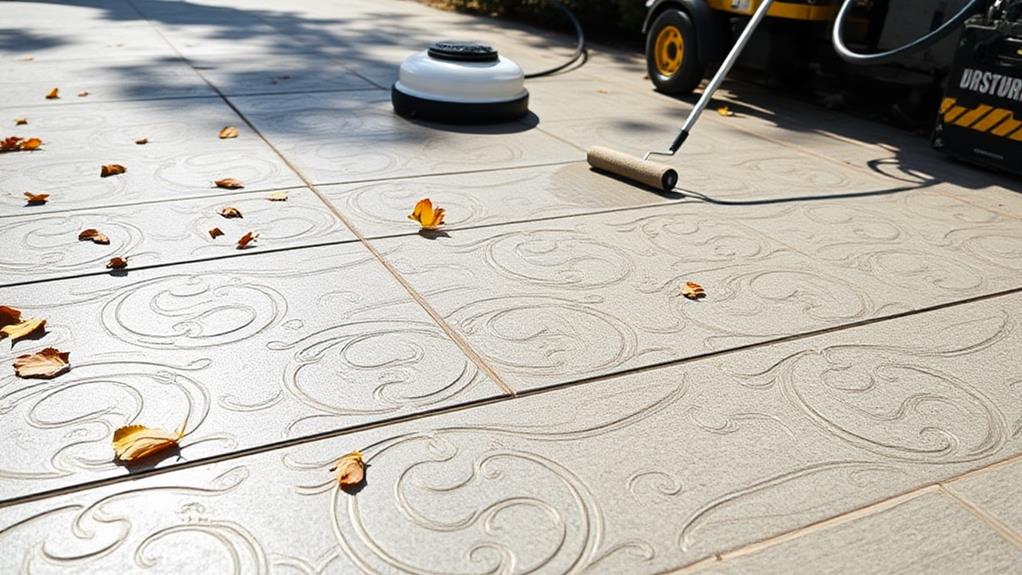
Maintaining your concrete driveway is vital for its longevity and aesthetic appeal. You'll need to employ regular cleaning methods, apply sealants for protection, and address common issues promptly to keep your driveway in top condition. Let's examine these maintenance tips in detail, focusing on practical strategies you can implement to preserve your investment:
| Maintenance Aspect | Frequency | Key Considerations |
|---|---|---|
| Cleaning | Monthly | Use pressure washer or stiff-bristled brush |
| Sealing | Every 2-5 years | Choose weather-appropriate sealant |
| Repairs | As needed | Address cracks and chips immediately |
Regular Cleaning Methods
Regular cleaning is the cornerstone of concrete driveway maintenance. By adhering to a consistent cleaning routine, you'll not only preserve your driveway's appearance but also extend its lifespan. Begin by sweeping the surface weekly to remove debris and prevent staining.
For more thorough cleaning, use a pressure washer on a low setting, working methodically from one end to the other. Be cautious not to damage the concrete with excessive pressure.
For stubborn stains, apply a specialized concrete cleaner and scrub with a stiff-bristled brush. Rinse thoroughly and allow the surface to dry completely. Oil and grease stains may require a degreaser or poultice treatment. Always test cleaning products on a small, inconspicuous area first to secure they won't discolor or etch the concrete.
In regions prone to freezing temperatures, avoid using de-icing salts, as they can damage the concrete surface. Instead, opt for sand or kitty litter to improve traction. Regularly inspect your driveway for cracks or chips, addressing them promptly to prevent further deterioration. By incorporating these cleaning methods into your maintenance routine, you'll safeguard your concrete driveway remains a durable and attractive asset to your property for years to come.
Sealing and Protection
Shielding your concrete driveway from the elements is essential for its longevity. To protect your investment and maintain its aesthetic appeal, you'll need to apply a high-quality sealer. This protective barrier repels water, oil, and other potentially damaging substances, preventing them from penetrating the concrete's surface.
You'll find that sealing your driveway not only enhances its durability but also intensifies its color and sheen, giving it a polished look that'll make your home stand out in the neighborhood.
When selecting a sealer, you'll encounter two primary types: penetrating sealers and topical coatings. Penetrating sealers absorb into the concrete, offering invisible protection without altering the surface appearance. Topical coatings, on the other hand, form a protective film on the surface, which can enhance color and provide a glossy finish.
You'll need to reapply sealers periodically, typically every 2-5 years, depending on traffic and weather conditions. By diligently maintaining your driveway's protective seal, you're not only preserving its structural integrity but also ensuring it remains an attractive feature of your property for years to come.
Repairing Common Issues
Tackling common issues promptly is key to maintaining your concrete driveway's longevity and appearance. As a homeowner, you'll want to address cracks, spalling, and discoloration as soon as they arise.
For hairline cracks, you can apply a concrete crack filler, guaranteeing it's fully cured before sealing. Larger cracks may require professional intervention, involving epoxy injection or patching compounds.
Spalling, where the surface flakes or peels, often results from freeze-thaw cycles or de-icing chemicals. You'll need to clean the affected area thoroughly, apply a concrete resurfacer, and seal it properly.
For oil stains, use a poultice made of sawdust and a degreasing agent, leaving it on for 24 hours before removal. Persistent stains may necessitate pressure washing or chemical cleaners.
Efflorescence, the white powdery substance that sometimes appears on concrete surfaces, can be removed with a mild acid solution or specialized efflorescence remover. Always test cleaning products on a small, inconspicuous area first.
Concrete Contractor FAQ
How Long Does It Take for a New Concrete Driveway to Cure Completely?
You'll find that your new concrete driveway typically takes about 28 days to cure completely. However, you can walk on it after 24-48 hours and drive on it after 7 days. It's important to follow your contractor's guidance.
Can I Install a Heated Driveway System in My Concrete Driveway?
Yes, you can install a heated driveway system in your concrete driveway. It's a great way to keep your space safe and ice-free during winter. You'll enjoy the convenience and peace of mind it brings to your home.
Are There Eco-Friendly Options for Concrete Driveways?
You'll love the eco-friendly options for your concrete driveway! You can use pervious concrete, which allows water to seep through, or incorporate recycled materials like glass or plastic. These choices show you care about our environment.
How Does Climate Affect the Choice of Concrete Driveway Design?
Your climate plays a big role in selecting your driveway design. You'll want to evaluate temperature swings, moisture levels, and freeze-thaw cycles. Don't worry, there's a perfect option for your area that'll make you feel right at home!
What Are the Cost Differences Between Various Concrete Driveway Designs?
You'll find that costs vary widely among concrete driveway designs. Simple, plain finishes are your most budget-friendly option. As you add stamping, staining, or intricate patterns, prices climb. Your choice reflects your style and budget preferences.
